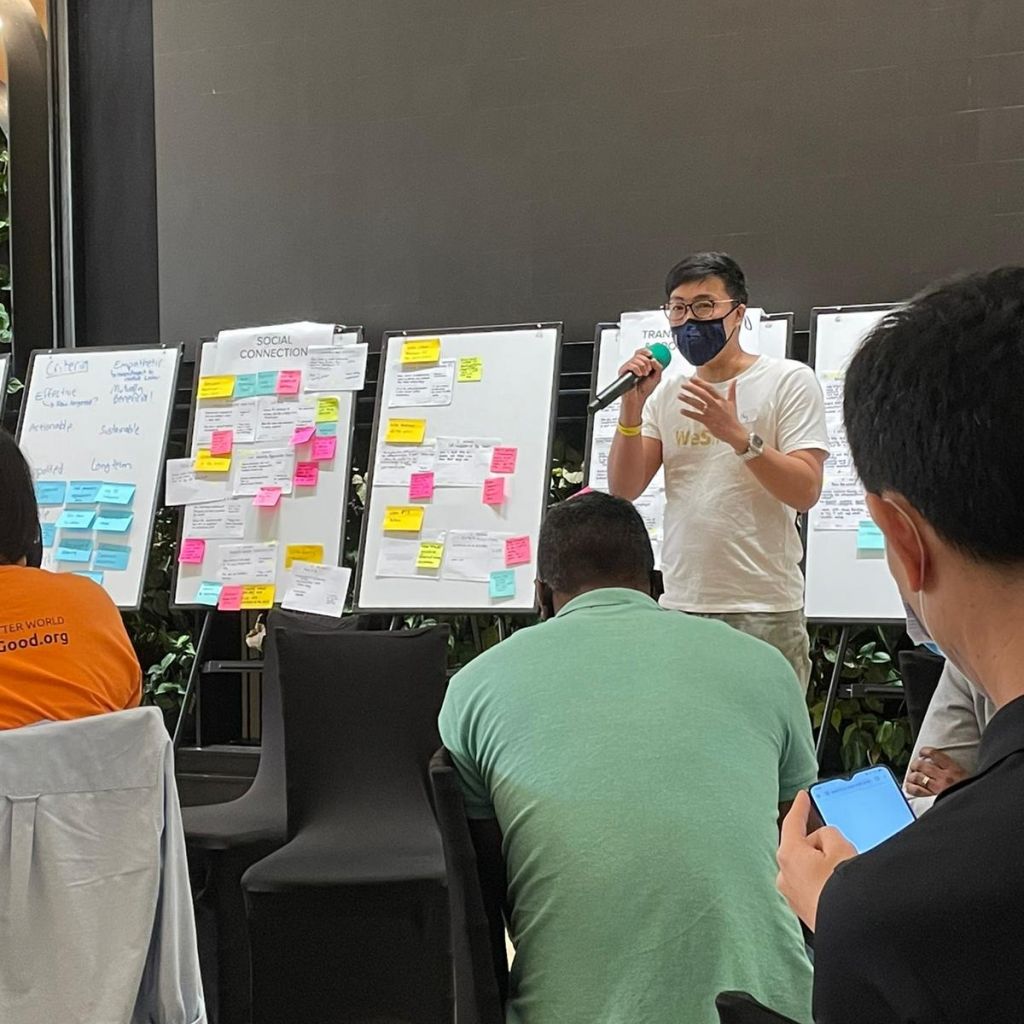BRANDED CONTENT
Volunteers on lower-wage workers: They deserve better
Covid-19 has underscored the value of essential services provided by lower-wage workers. From cleaners and security officers to delivery riders, one thing’s for certain: We count on them in a crisis.

Mr Jay Ng speaking during a sharing session with members of the Alliance for Action for Lower-Wage Workers.
PHOTO: COURTESY OF JAY NG
How can we better recognise their contributions and give them a fair shake? Three members of the Singapore Together Alliance for Action for Lower-Wage Workers (AfA for LWW) walk the talk on lifting the lot of the lower-wage worker.
He matches workers to jobs over makan
Even before the Covid-19 pandemic, Mr Jay Ng, 38, was already volunteering to help lower-income families, migrant workers and other marginalised groups in Singapore.
But when he saw his lower-wage friends losing their jobs and struggling to put food on the table during the crisis, he went a step further: He quit his job at the fintech firm he co-founded in 2018.
Why give up a six-figure job? To serve the needy by setting up a social enterprise organisation called WeShine.
Launched last November, WeShine aims to equip disadvantaged people, including lower-wage workers, with new skills and match them with higher-paying and more stable jobs.
Last month, Mr Ng led a project under the Alliance for Action for Lower-Wage Workers (AfA for LWW) to pilot a new initiative, Makan&Shine, where volunteers learn about the lives and needs of workers and offer advice and casual conversation over free meals.
The volunteers come from all walks of life, ranging from working professionals to those with expertise in career development or recruitment. The workers who attend these meet-ups over meals typically need help with training and employment. They are recommended to Mr Ng's group by family service centres, social enterprises and other activists.
"We train our hosts to handle different situations. For example how to respond appropriately if a friend asks for money," says Mr Ng.
"We also match hosts with friends (a term used to refer to the workers they meet) in meaningful ways, including by pairing those who work in the same industry, such as food and beverage.
"We want hosts to journey with their friends and help them overcome complex and structural issues in their lives."
The volunteers, who range from 30 to 60 years old, have hosted about 10 meals in person and virtually so far, with up to five friends attending these get-togethers at a time.
They have so far paired about 20 people with better jobs, including a woman with a young daughter who moved from shift work in the food and beverage industry to a more stable, higher-paying job with fixed hours.
"We're also collaborating with Sales Excellence Institute, a training institute, to design bite-size lessons on topics such as inner transformation and motivation, which we can conduct in 20 to 25 minutes during the meet-ups," he says.
Mr Ng credits the new AfA for LWW for giving WeShine a crucial boost.
The AfA, launched in March, aims to mobilise Singaporeans in a whole-of-society effort to uplift lower-wage workers. Its 50 members include youth and representatives from unions, businesses and community groups.
They are working on projects that focus on four areas: Strengthening respect and appreciation for lower-wage workers among the public; encouraging supportive working environments; increasing support for and benefits from upskilling; and driving support for progressive wages.
Tripartite partners have been engaged with the project teams throughout to help them test out their ideas on the ground and create a sustained impact on the lives of LWWs beyond the AfA.
Mr Ng says that he was invited to join the AfA after he shared his passion for uplifting LWWs in Singapore with MOM in November last year. Mr Ng formed a team of 11 members under the AfA to develop and test the Makan&Shine initiative.
"The AfA puts us in touch with like-minded employers such as Seoul Garden and Mothercare, which makes the job matching easier as we are able to learn more about their requirements and recommend suitable people," he says.
The AfA team is refining the Makan&Shine programme and plans to scale it up. Changes on the table include requiring hosts to commit to multiple meals with the same beneficiaries to strengthen relationships and ensure continual help.
"We are also developing frameworks and materials that the hosts can use in giving advice, for example, about different schemes and initiatives like SkillsFuture," he says. "It will also be useful to have something that we can give to our friends to refer to on their own."
Mr Ng will also leverage technology to help lower-wage workers seek better jobs and suitable training programmes. "We intend to have a platform where hosts can input data about our friends, with their consent and in full compliance with data privacy regulations, to better recommend suitable skills training and available jobs.
"If you are a cleaner who wants to have a specific job, our hosts can use the platform to see what courses you can attend to get the skills you need, and your job opportunities.
"We hope that our work will be the foundation for a community-driven approach, empowered by technology to help lower-wage workers, and that our small pilot programmes become a much larger movement."
He's pushing for 'organisations of conscience'
Some companies wishing to do better by their workers may not know where to begin or may lack the resources to do so.
To help these businesses, Mr Karthigayan Ramakrishnan is developing a microsite that collates relevant guidelines, for example on the progressive wage model, best practices from firms, links to useful schemes and initiatives, and contact details of consultants who can help.

The 38-year-old manager at the Singapore Indian Development Association, is taking part in the AfA for LWW as a volunteer for tech-for-good non-profit organisation Better.SG. He says the site will also raise awareness about the difficulties faced by lower-wage workers.
He also hopes that it will encourage more small and medium enterprises (SMEs) to become "organisations of conscience", or companies that place their workers' well-being at the core of their values.
"Many SMEs are focused on keeping the lights on and paying their workers on time. If they want to do more for their employees, our site will give them the know-how, networks and resources to take concrete steps, or point them to others who can help if they cannot do so themselves," he says.
To date, his seven-person team in the AfA has produced a prototype of the site. They aim to test-run it for feedback before launching the actual site.
"We also plan to create an informal network, for example through WhatsApp or Telegram, where firms can get advice on workers' welfare from one another. We want businesses to take ownership in moving their industries forward.
"At the end of the day, we want dignity for all, including essential lower-wage workers. To achieve that we need supportive workplaces that have their workers' well-being at heart."
He sees value in simple gestures
Lower-wage workers are essential to Singaporeans' daily lives, from the cleaners who keep housing estates spick and span to the uncles and aunties at hawker centres.
Yet, too many people take them for granted, says Mr Monteiro Mohamad Azhar Bin Abdul Aziz, 29, a building superintendent at logistics supply chain firm Connecting World Trade.

To get more people to show their appreciation for them, Mr Monteiro, who is also an NTUC branch chairman, is working on a project called Let's GREET - short for "get to know the workers, and recognise, encourage, empower and thank them".
The project will see Mr Monteiro's team of nine producing a comic strip and other publicity materials to guide people on how to show their appreciation to these workers.
"Our goal is for people to greet workers among us more often and get to know them better.
We also have a template of an appreciation card that people can print to write notes of appreciation for the workers," he says.
"We hope this will become like the ice bucket challenge, where you write a note to someone and call on your friends and others to pass on such acts of kindness."
Such simple gestures, he feels, can leave a deep impression.
In 2015, while working at Keppel Shipyard to build and repair ships, he joined Young NTUC - the youth wing of NTUC - as a chairperson for the industrial sector.
Seeing how his fellow colleagues at the shipyard worked tirelessly all day, he decided to use a $1,000 grant from the Young NTUC U Heart Start-up Fund to organise annual appreciation days for them. The fund encourages young volunteers, up to 35 years old, to give back to society through such projects.
"My idea was to rent a photo booth so that the workers could take photos to send back to their families if they came from overseas, or to keep as mementoes of their time in Keppel. I also brought in cotton candy and popcorn for them. It was a hit and they appreciated this recognition of their work," he says.
"We need to work on issues such as ensuring adequate rest areas and breaks for lower-wage workers, especially for those who are on their feet all day, like cleaners and security officers. But showing appreciation for their work is a basic part of making them feel welcome and letting them know that they are a key part of our community."
Building Singapore together
The AfA for LWW is one of 25 collaborative groups from the people, public and private sectors set up to address a range of issues raised during the Singapore Together Emerging Stronger Conversations.
Launched last June, the Emerging Stronger Conversations saw more than 17,000 Singaporeans share their experiences grappling with the Covid-19 pandemic, and their ideas for how the economy and society can become after the pandemic is over. Many have shared a common aspiration to build a caring, just and equal Singapore.
Have a question about the AfA for Lower-Wage Workers or Singapore Together? E-mail your questions to askST@sph.com.sg. Look out for the answers on Aug 15.
As consumers, are we prepared to pay a little more for products and services if it gives our lower-wage workers higher wages? What can we do to show our appreciation for our lower-wage workers? Click here to learn more about lower-wage worker issues.
This is the third of a four-part series in partnership with the Ministry of Culture, Community and Youth.


